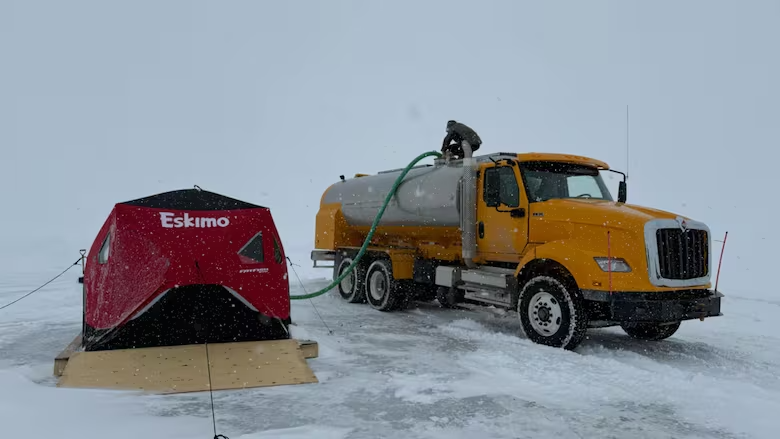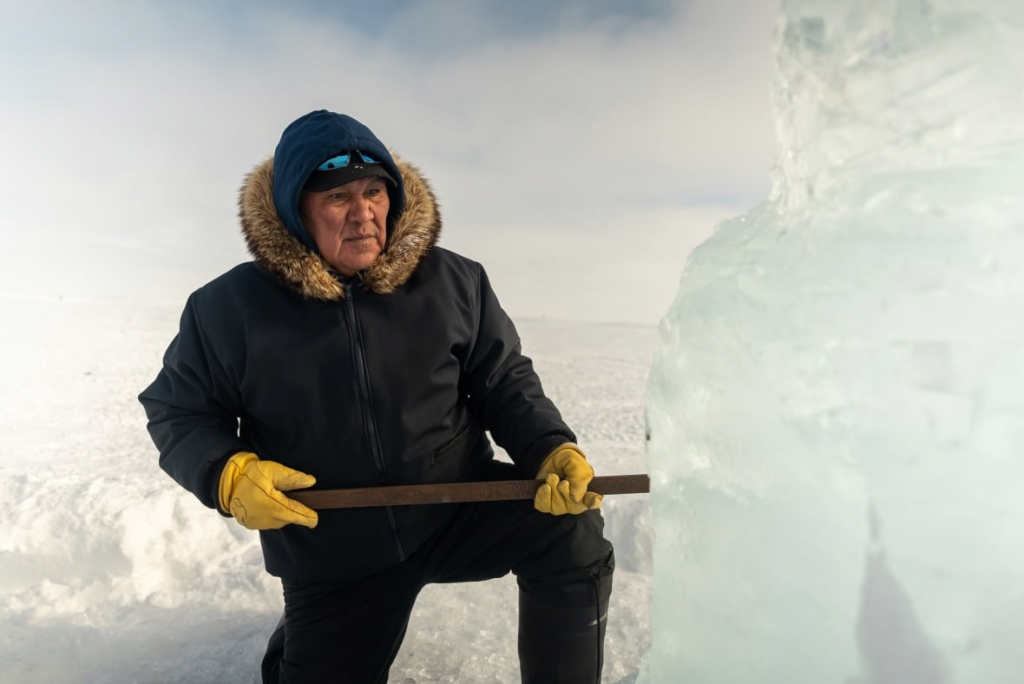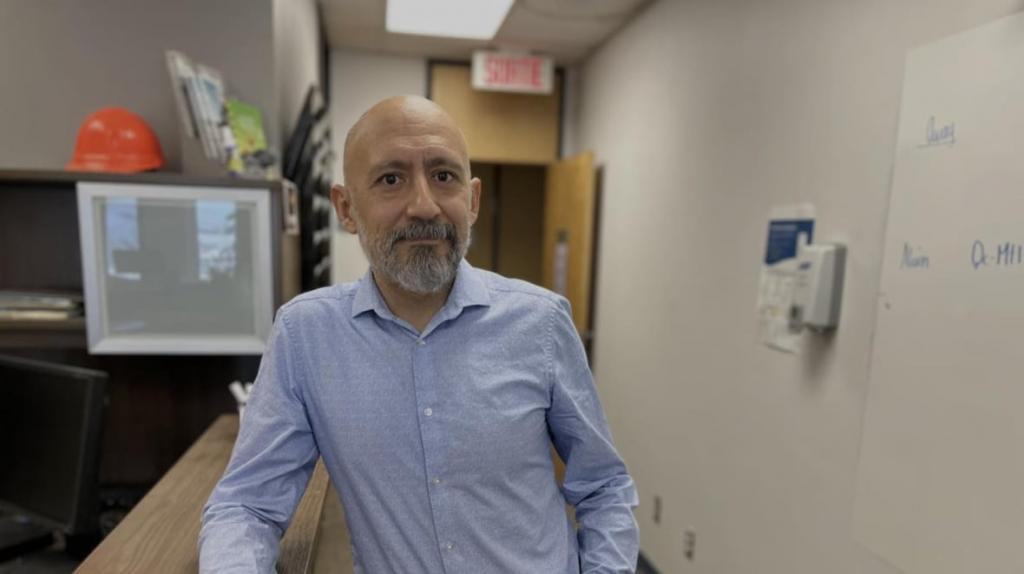Sicknesses spread as Puvirnituq, Que., struggles to restore water flow through frozen pipe

By Samuel Wat
Bad weather continues to hamper water delivery and installation of temporary pipe
Efforts to restore water flow in Puvirnituq, Que., are being blocked by bad weather, as residents continue to struggle with the spread of sicknesses and days on end without water delivery.
The village’s pipeline, which connects the water pumping station to the treatment plant, has been frozen since at least March. That has forced the village to drive further out of town to truck in water and have it manually chlorinated, slowing delivery to the community of roughly 2,100 people.
The Kativik Regional Government (KRG) said those issues have deteriorated further now, with extreme winter conditions and several water delivery trucks still out of action.
Muncy Novalinga, who lives in Puvirnituq, said many in his community are continuing to go days — even weeks, now — without water delivery.
“It’s the worst I’ve seen it … to make matters worse, right now, our road system is full of slush. The water trucks are getting stuck,” he said.

Those slushy, snow-clogged roads are also affecting sewage collection, leaving some residents with full sewage tanks.
“[When that happens], we have to go elsewhere to relieve ourselves,” he said.
Parts for a temporary replacement pipe have arrived, though Hossein Shafeghati, KRG’s director of municipal public works, said that interim fix won’t be ready until June now.
That’s due to a pile-up of snow in the area where the pipe is set to be installed, plus continued sub-zero temperatures that make it unsafe to pump water.
Gastroenteritis cases on the rise
The hospital has priority for water delivery — though it’s faced multiple cuts in water in past weeks.
It normally receives water through an underground line that connects directly to the water treatment plant. Last week, Mayor Lucy Qalingo told CBC they’re manually trucking 70,000 litres of water every day to the hospital.

Dr. Marie-Faye Galarneau, who’s worked there for five years, has decided to resign due to the conditions — though that decision comes with some guilt.
“I was in the emergency room this week, a child came very dehydrated. No water at home for two weeks. He has gastroenteritis, vomiting, diarrhea. I had to admit the child overnight and the water was cut during his hospitalization,” she said.
She said the laboratory closed one day due to unsanitary conditions.
“Nobody’s putting pressure on the wound, and we’re letting the patient bleed out — that’s my feeling about how authorities and the Quebec government are acting right now,” she said.

Dr. Yassen Tcholakov, the health board’s acting public health director, said he recognizes the toll the situation has on workers and patients.
“There are conversations around what services can continue operating given the situation,” he said.
Contingency plans are in motion to maintain current operations, he said, and that includes the use of disposable medical equipment.
He said there has also been a rise in gastroenteritis cases (stomach flu), which is highly contagious and can be spread through contact with infected people and contaminated surfaces.
Given the current situation, the usual advice for preventing transmission doesn’t work.
“You can clean your hands with alcohol solutions, but that gets you only so far … You also need to do things like cleaning your bathroom,” he said.

Disruptions in schools continue
Not being able to flush toilets, secondary school student Brooke Sivuarapik said, is stinking up homes.
“There’s a lot of people right now melting snow, and they’re dumping it in the toilet so we can flush,” they said.
“As the eldest [of several siblings], I have a lot of responsibilities. I had to pick up snow to melt for the toilets. They really count on me.”
The school board, Kativik Ilisarniliriniq, said schools and education centres must close every time water and sewage services are suspended for more than two hours.
The secondary Iguarsivik School has closed for a day and a half in the last month, due to water shortages and an E. coli outbreak in the community. The school acquired a water filtering system three weeks ago.
Water issues at home mean some students aren’t able to go to school in the first place, according to secondary school teacher Taylor Adams. That’s also a concern right in the middle of exam season.
“They’re doing everything they can to come to school. But if they don’t have water and they’re sick, there’s really only so much we can expect from them,” she said.
Court appearances diverted elsewhere
Quebec’s Ministère de la Sécurité publique has confirmed court appearances in the week of April 28 were diverted to the Amos courthouse instead.
It said it’s still awaiting instructions from the Ministère de la Justice about future appearances, though there are indications they will be moved to Amos or Val-d’Or.
Follow-up meetings between offenders and their probation officers always take place within the community, the Ministère de la Sécurité publique said, and employees are provided with potable water during their on-site visits.
Money is a challenge
Officials from regional departments — which include Nunavik’s health board and the KRG — met Wednesday to discuss the path forward. In the short term, Shafeghati said that could mean flying in supplies, though transportation to the North is costly.
“We’ll have further discussions … to see what ways would be possible to distribute drinking [water] … and also pandemic-style sanitary things, like hand sanitizer, disinfection wipes,” he said.
“That [cost] will have to be absorbed by someone because certainly the municipality doesn’t have that kind of money. You can do it for a day or two, but that would not be able to be sustained for a few weeks.”

Meanwhile, calls within the community are growing for other levels of government to step up.
“We need a state of emergency to be declared … local resources are working their best but it’s insufficient to meet the needs of the entire community,” Marie-Faye Galarneau said.
A local municipality, by law, can declare a state of emergency when “the normal operating rules do not make it possible to take the immediate actions required to protect human life, health or integrity.”
That can trigger external support from higher levels of government — something Muncy Novalinga also believes is necessary.
“Please come and help us and assist us any way you can. We have an airstrip that can be used by a Hercules plane.”
Related stories from around the North:
Canada: Aupaluk residents fed up with lack of safe drinking water, CBC News



